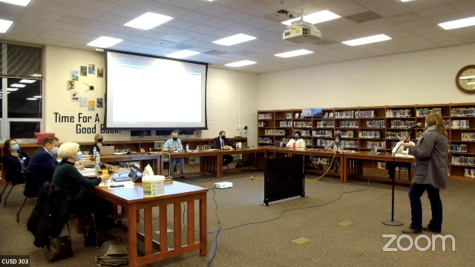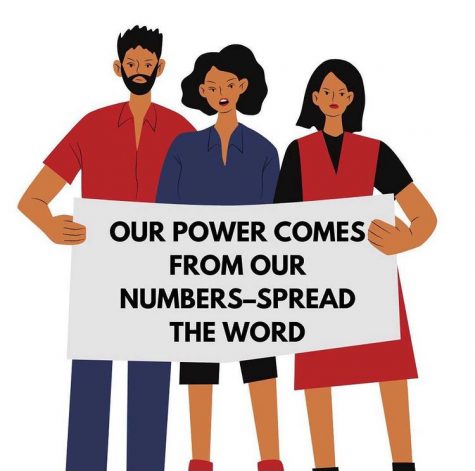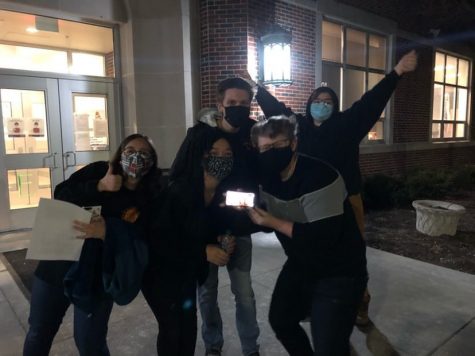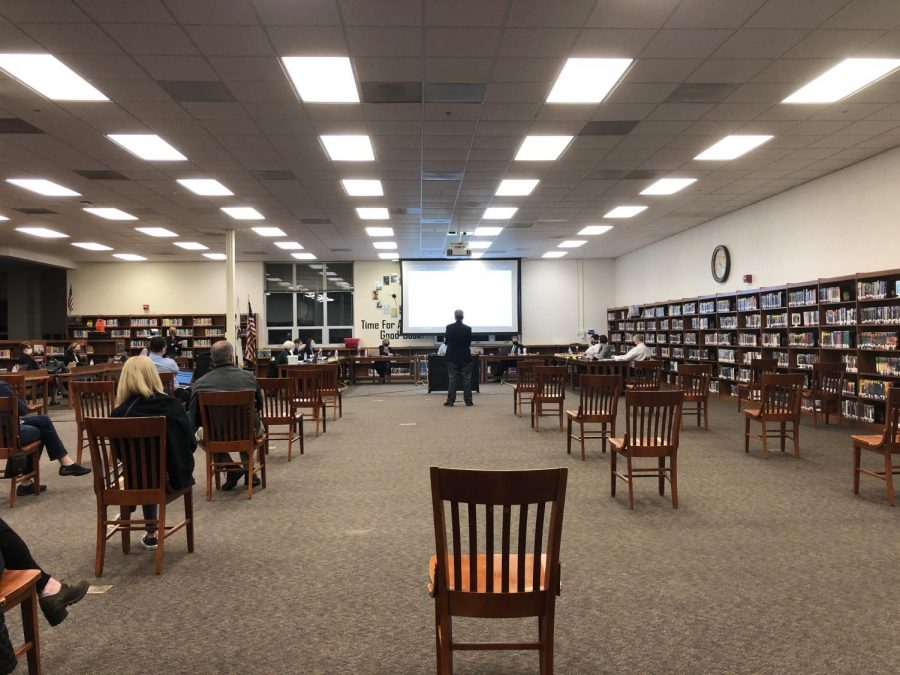Student-led Protest Helps Pass New Equity Program
The large number of community speakers pushed Deep Equity earlier in the meeting schedule, so students wouldn’t have to stay late to hear the vote.
March 19, 2021
In recent years, BLM and LGBTQ+ movements have helped educate communities on different kinds of adversity in order to help people of diverse backgrounds succeed. The data of unequal opportunities have since surfaced for minorities and underprivileged students.
On June 4, 2020, following the homicide of George Floyd, D303 released a statement recognizing existing systematic hardship affecting students’ health and performance, while also approving an agenda of improving equity for students with difficult backgrounds. On Monday, Mar. 8, the D303 Board of Education met to discuss and vote on approving a multitude of programs including a diversity and equity inclusion program called Deep Equity. Deep Equity passed with a 4 to 3 vote, and the BOE voted to hire a Director of Diversity, Equity and Inclusion.
A month before the BOE meeting, a student-led equity equality protest began on social media platforms to organize a student sit-in protest at the meeting to push for Deep Equity. Two St. Charles East students, senior Elena Gdula and sophomore Ava Johnson, both heard about the student-led protest through a friend.
“There were a lot of talk in late February, kind of like leading up to that meeting, and like statistics shared and information about what you can do to help: recording videos, sending letters, sending emails, all sorts of things,” said Johnson. “So that really helped convince me like ‘this is something I can get involved with and do,’ and ‘I think it’s really important that I go in and sit at the meeting.’“
Board members were sent dozens of emails from students across D303 to support the approval of Deep Equity among the board.
“We all received a lot of board emails from students […] it’s our jobs as parents to advocate for our kids, but it makes me proud to be on the board, to hear our students come and talk to us, or send us emails and everything,” said Board of Education President Nick Manheim.
The BOE meetings begin with volunteer speakers to tell the board their perspectives on the meeting’s items. The meeting on Mar. 8 met the maximum number of 50 attendees allowed. The segment for community speakers took over an hour to finish.
“There’s supposed to only be like 30 minutes allotted to community statements, and with a three-minute time limit for each person. So then only like 10 people would be able to kind of go under those circumstances, but there were two sheets full of people who wanted to make their statements, and I think a lot of that was due to some of the students that were talking, ” said Johnson.

During the meeting, BOE members expressed their appreciation for student voices in their decision on Deep Equity.
“We are so proud of the courage, strength and pride it takes students to step in front of the mic and become a recognized leader with their powerful words and stories. Thank you all,” said Board of Education Vice President Carolyn Waibel.

Though not all students at the sit-in spoke to the board, their role in attending the sit-in still made an impact.
“That was the most important thing, just showing up and showing the board that the students really care about this issue, because the majority of the people who were speaking out against Deep Equity, were parents who haven’t been in school for like 30 years,” said Johnson.
Deep Equity is a 5-phase program, and some parents at the board shared their concerns about the ideas behind the program being radical or not, while advocating against its passing.
“Phase Three is ‘From Social Dominance to Social Justice’, and they’re not sure what that exactly means, but the point of this phase is to really create a school where more of the students across more diverse groups are achieving at higher levels and engaging in deeper levels without giving up who they are – without that assimilation aspect,” said board member Jillian Barker.
“It was kind of disheartening to see because at the board meeting, lots of parents spoke out against Deep Equity among other issues, and felt that it wasn’t right for the school, and it was sad to see that they were fighting against the thing that we wanted to bring,” said Gdula.
Recognizing the division between student and parent opinions, students encouraged others to speak on Deep Equity. Students, parents and board members expressed their nervousness to speak at the meeting on Mar. 8.
“I don’t think I’ve ever done such a speech in front of a board and people and adults who I’ve never met before, and who they don’t know who I am, so it was pretty nerve-racking. I was shaking a bit during my speech, but what went through my mind is that ‘I need to do this,” and ‘it’s a very important thing,” and that it’ll be worth it in the end,” said Gdula.
BOE meeting recordings, including community speakers, can be watched on D303’s YouTube channel or found on the D303 website.
“So since it was a four-to-three vote, and it was like that one person pushed it over, it was really nerve-racking in that moment,” said Johnson, “As soon as they said they were going to partner with Deep Equity, and the vote passed, I looked over to my friend that was next to me, who also made a speech, and I was like, ‘We did it.’”

D303 plans on beginning the Deep Equity program in April of this year, which will continue for 2-3 years and intends to have a long-lasting effect. Board members mentioned student effort to advocate for the Deep Equity program as a key factor in passing it.
“I really, really appreciate people sending in those stories. They were incredibly powerful. That is the reason why I ended up voting for Deep Equity was because of the student voice,” said Waibel.
Students of D303 have been very supportive of others speaking up for change in the community, sharing their perspectives and continuing to fight for a cause.
“I can say that student protests can and definitely have made a difference at D303,” said Gdula. “It is very powerful to see not just parents, but the voices of actual students who are directly affected by these issues, go out and speak their mind and protest to help solve these issues and gain better lives for their fellow students.”
Board of Education members welcome students to continue voicing their opinions.
“When it comes to an issue of safety, emotional safety, mental health, the student perspective is always important because we’re hearing from the individuals involved themselves,” said Waibel, “and I really, really appreciate kids talking to us. The board is available anytime, our phone numbers are on the website, our emails are on Let’s Talk, our board meetings are posted, we’re available whenever.”
This influence of student voices that helped in passing Deep Equity could continue to affect future agendas for D303.
“There are still other things that will come up that we need people to be a part of, to spread the word about, to make sure that everyone kind of knows what’s going on,” said Johnson.
Students of the protest signed a digital thank you card for members of the Board of Education to represent their appreciation for allowing student voices to be heard.
“You can show your power as a student by protesting and showing that you deserve the equity you need in all areas of school education, and your mental health and other parts that you feel are necessary for you to have success in your life, “ said Gdula.



Kavin Thakkar • Mar 19, 2021 at 12:59 pm
Great article! It was amazing to see this turnout for equity. Barker is also the BOE Secretary.